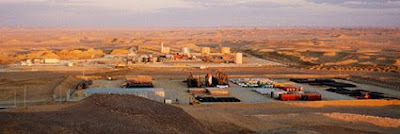Sidoarjo Village
A mud eruption in Java, Indonesia, has flooded villages and forced more than 11,000 people to abandon their homes. The eruption started on May 29th when hot mud cracked the surface and was ejected several meters into the air. The eruption site was close to a hydrocarbon exploration well. It is not clear if the eruption was triggered by the drilling or by an earthquake striking two days earlier.
Since the initial rupture, incredible amounts of mud, water and gas has continued to erupt, reaching more than 160,000 cubic meters per day. Today, an area of several km2 is covered by mud which thickness exceeds 7 meters in the perimeter around the 30-40 m wide crater. Surely a much large region would have been covered if it wasn't for the dams that are frantically been built to contain the mud and avoid further flood in the Sidoarjo village.


Researchers from Physics of Geological Processes, a Center of Excellence at the University of Oslo, returned this week from an expedition to East Java, bringing mud, water, gas samples, pictures, and videos for analysis in order to determine the origin and the mechanisms governing the mud eruption.
Adriano Mazzini, PGP, the expedition leader: "This ongoing mud eruption gives a unique opportunity to observe the evolution of a newly born vent structure. The access to the crater allows us to combine detailed sampling and observations with the geological data from the area. Combining direct observations with numerical and analogue modeling will help us to understand the activity of the mud eruption."
The PGP team has extensive experience in studying mud volcanoes and fluid eruption features. These are processes that are occurring naturally in many places in the world. Mud volcanoes are often closely related to seeps of oil and gas, e.g., onshore around Baku in Azerbaijan, in Crimea, along fault planes in Trinidad, or offshore in the Norwegian Sea, Barents Sea, along the Mediterranean Ridge, and the Gulf of Cadiz. The mud eruption in Java occurred in an area where there are several dormant mud volcanoes that have had large eruptions in the past.


